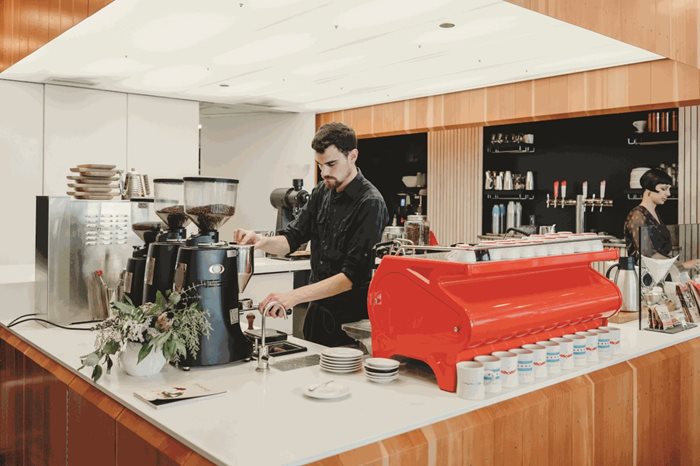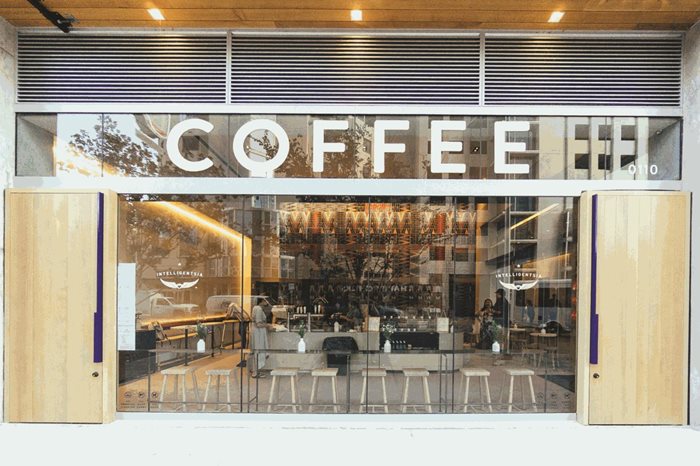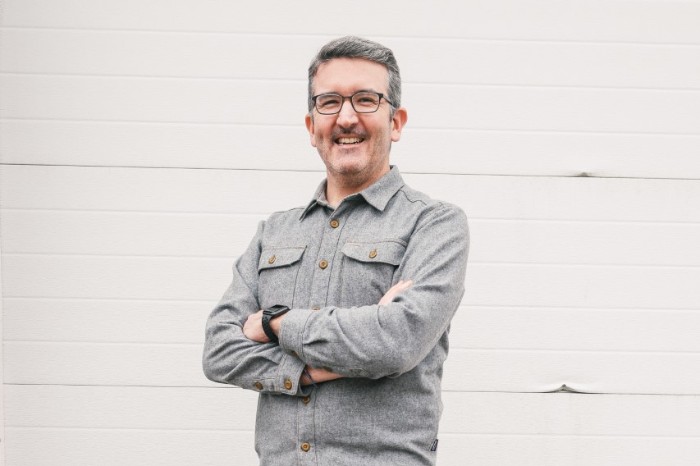It’s a quarter of a century since Intelligentsia Coffee quietly began changing America’s relationship with its daily cup of Joe. 5THWAVE caught up with the specialty roaster and coffee bar’s President and CEO James McLaughlin to find out how the brand is continuing to make waves in the US specialty coffee community and beyond

Intelligentsia’s Shoal Creek coffee bar, Austin | Photo credit: Intelligentsia Coffee
It’s 1995. Pixar releases the first ever full-length computer animated feature film,
Toy Story. Microsoft unveils its ground-breaking Windows ’95 operating system. Internet search engine Yahoo! is incorporated. And, the early ripples of third wave coffee culture are emanating across the US.
On 9 October 1995, entrepreneurs Doug Zell and Emily Mange set out on a mission to elevate their local coffee scene, opening the
first Intelligentsia Coffee bar in Lakeview, Chicago.
Here the duo honed Intelligentsia’s signature Black Cat espresso blend on their trusty Probat L12. In the years that followed, they would introduce many US consumers to their first taste of specialty coffee, direct trade, and boutique store design.
“Intelligentsia was one of the first brands to celebrate coffee as a seasonal beverage with optimal times to enjoy, instead of a product that is available 365-days per year,” says Intelligentsia’s President and CEO, James McLaughlin.
In fact, Intelligentsia is credited with a number of pioneering initiatives in the specialty coffee world. Its ground-breaking 2003 sourcing trip to Huehuetenango, Guatemala, was the first to be taken with an active direct trade programme. Intelligentsia was also the first coffee shop to adopt Clover drip coffee machines, whose manufacturer The Coffee Equipment Company was later acquired by Starbucks for brewing its super-premium Reserve range.
“Quality and convenience will continue to be central focuses in the US coffee industry”
Intelligentsia is also widely credited with hosting the first modern public latte art throwdown (a long-standing in-house tradition) during a Specialty Coffee Association (SCA) event hosted at its Los Angeles roastery on 2 May 2007.
“These competitions elevated the status of the those preparing your coffee each morning to an integral part of the coffee quality supply chain,” says McLaughlin.
McLaughlin also highlights Intelligentsia’s entrance to the Los Angeles market in 2007 as pivotal for the brand’s industry standing.
“Our Venice and Silver Lake coffee bars set the standard for the specialty coffee shop industry, creating beautiful spaces for customers to enjoy an elevated coffee experience,” he says.
Today, Intelligentsia operates 15 stores across Chicago, Los Angeles, New York, Boston and Austin. Roasteries in Chicago and Los Angeles, as well as specialist training labs in New York and Boston, keep both the coffee beans and expertise flowing across the many communities they serve.

Intelligentsia coffee bar, Wicker Park | Photo credit: Intelligentsia Coffee
Sourcing excellence
Long-term relationships with coffee producers continue to be a central pillar of the Intelligentsia brand. With his background in the Brazilian agricultural sector, previous Intelligentsia role as Director of Green Coffee and work as a World Coffee Research board member, McLaughlin remains a staunch proponent of direct trade in the coffee industry.
“Green coffee focus opens up a much deeper conversation around coffee quality; it celebrates the work of the farmer, the land and the plant,” he says.
Today, Intelligentsia maintains producer partnerships across Burundi, Colombia, Costa Rica, El Salvador, Ethiopia, Honduras, Kenya and Mexico, and prides itself on visiting the 50+ producers it works with at least 3-4 times a year.
But it was back in 2009 that Intelligentsia first sought to dynamise its growing global network of coffee producers, holding the first
Extraordinary Coffee Workshop (ECW) in Cauca, Colombia. The brainchild of Intelligentsia's Vice President of Coffee, and influential green coffee buyer, Geoff Watts, ECW is billed as ‘Woodstock for coffee’ and provides a platform for coffee producers to collaborate across agronomic practices, creative approaches to harvesting, innovations in post-harvest infrastructure, processing and policy.
“Consumers want to know that coffee companies are treating everyone in the supply chain correctly”
Like coffee events the world over, ECW 2020, due to be held in Rwanda in May, was cancelled due to Covid-19. With temporary café closures also impacting coffee demand during the pandemic, Intelligentsia has worked to support coffee producers entering a difficult 2020 buying season across Central America and Africa.
“We are being very transparent about where demand is and how that is affecting the product mix. We have not made any decisions to pay less for coffee – we have not compromised on that at all – the price and the quantity are very important to producers,” says McLaughlin.
In yet another sign that once outsider practices are steadily being absorbed into mainstream coffee culture, McLaughlin believes that despite the pandemic, consumers are increasingly valuing sourcing transparency when choosing their coffee.
“Consumers want to know that coffee companies are treating everyone in the supply chain correctly and we are going to see more traceability in the US specialty coffee industry as a result of that.
“Customers should take the time to dig into claims made by roasters and importers – not all direct trade is created equally,” McLaughlin urges.
New ways of business
As well as influencing a major cultural shift in US coffee consumption, Intelligentsia proved that specialty coffee, artisan food and high-quality store design, could be lucrative business opportunities. In this regard, Intelligentsia is also a pioneering 5th Wave brand, having successfully scaled its boutique business into a commercial and cultural force during the 2010s.
When James McLaughlin was appointed CEO and President of Intelligentsia in 2014, in addition to a strong background in green coffee sourcing, he brought with him a blend of legal skills honed as a Chicago attorney representing Fortune 500 companies.
When, in October 2015, veteran US coffee chain Peet’s Coffee & Tea, itself part of JAB Holding Company,
acquired a majority stake in Intelligentsia, McLaughlin was tasked with steering the brand, and its local customer base, through a new period of growth.
Since then, Intelligentsia has expanded into Boston, New York and Austin, as well as opening a coffee bar within the TWA hotel. Ever at the forefront of emerging coffee trends, in 2021 Intelligentsia will open a new coffee bar in Pasadena, California, exclusively dedicated to specialty instant coffee.

James McLaughlin, President and CEO, Intelligentsia Coffee
“There won’t be an espresso machine or likely even a grinder in the building. This model is faster, more efficient, more flexible, more consistent and customisable,” says McLaughlin, adding 2021 will also see Intelligentsia launch its own ready-to-drink (RTD) coffee products.
But in 2020, McLaughlin’s leadership skills were tested as never before as Intelligentsia navigated the extraordinary trading disruption caused by Covid-19.
“Even before the pandemic reached the US, we were talking internally about how we could manage supply chain issues. We were thinking through what could happen with disruption at the port for our green coffee supply and the impact we might see on equipment manufacturers.
“But everything we did was through the lens of keeping our employees, and the communities that we serve, safe.”
Like most café businesses, Intelligentsia was forced to temporarily close many of its outlets during early 2020. Fortunately, the abrupt loss of coffee shops and wholesale revenues was to a significant degree offset by a surge in online retail packaged coffee sales. Moreover, the business was able to strengthen established retail relationships with US supermarkets, including Target and Whole Foods.
“Closing our coffee bars was not an easy decision and the impact on our wholesale business was very challenging – our away-from-home channels fell to virtually zero. But we then saw a massive switch from our coffee bars, hospitality clients and offices to at-home consumption. We were regularly seeing online order volumes on the magnitude of Cyber Monday.”
Today, even with the majority of its stores operational, albeit with stringent safety measures in place, McLaughlin points to a more fundamental shift in the way customers are purchasing and consuming coffee, particularly through
at-home and e-commerce channels.
“I am optimistic that our industry is full of creative and innovative people and we will see new experiences emerge out of this that in many ways will improve customers’ connection with coffee"
Covid-19, he says, is accelerating investment in e-commerce platforms, cashless transactions, pick-up and delivery, to facilitate seamless and safe customer experiences.
“Quality and convenience will continue to be central focuses in the US coffee industry with the challenge being to create delicious cups of coffee in convenient formats that are easy to prepare for consumers.
“Unlocking this combination will introduce more consumers to specialty coffee, especially through at-home consumption. This will see high-quality coffee appearing more frequently outside of coffee bars.”
As for the future, McLaughlin is both pragmatic and optimistic on the near-term impact of coronavirus on the US coffee shop market.
“There is no doubt that we will be looking at a changed landscape. Companies that can innovate and respond to the 2020 changes will be better positioned to welcome more customers, as there will be fewer places to enjoy a cup of coffee post 2020.
“I am optimistic that our industry is full of creative and innovative people and we will see new experiences emerge out of this that in many ways will improve customers’ connection with coffee and all the people who work in specialty coffee – from farmers to roasters and baristas.”
Twenty-five years ago seasonality, direct trade and careers in coffee were often considered niche, perhaps even unprofitable practices. Yet today these principles are fast becoming part of the mainstream, and investing in them increasingly vital to commercial success in the global coffee industry.
Covid-19 will likely see the coffee shop landscape change dramatically over the next five years, but as history has shown with third wave pioneers like Intelligentsia, those coffee businesses able to embrace change today are best placed to become the leading lights of the coffee world tomorrow and beyond.
James McLaughlin is President and CEO of Intelligentsia Coffee
This article was first published in Issue 5 of 5THWAVE magazine.
Subscribe to 5THWAVE to receive each edition in print and digitally or sign up to our newsletter and be the first to read the latest articles and updates on World Coffee Portal research
